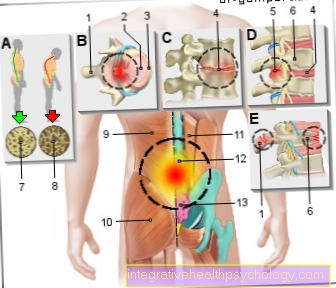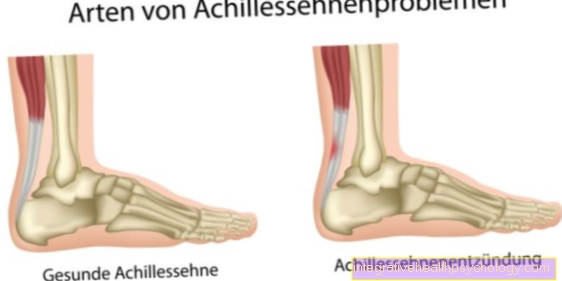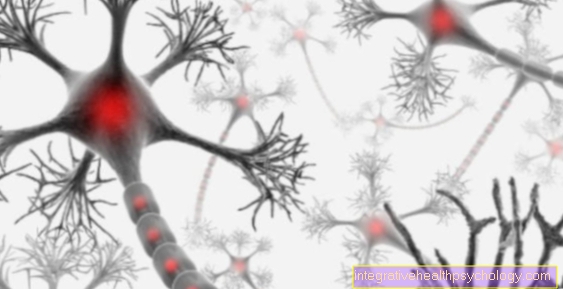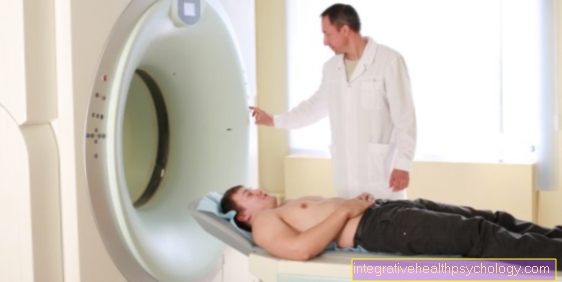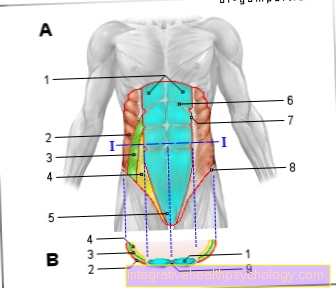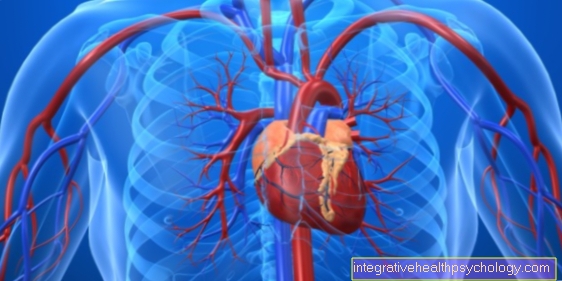Nerve inflammation on the head
introduction
An inflammation of the nerves is called neuritis, and in principle it can affect any nerve in the body. There are many nerves on the head, most of them belong to the cranial nerves, especially the trigeminal and facial nerves play a major role in nerve inflammation.
Here you will find a general overview of the topic of nerve inflammation

The causes of nerve inflammation in the head area do not differ in principle from causes in other parts of the body.
Various viruses are an important cause, here initially herpes viruses such as the varicella zoster virus (human herpes virus 3). This virus triggers chickenpox when it is first infected and then stays in the body's nerve cells, but is kept in check by the immune system. However, if there is an immune deficiency, for example due to stress or illness, the virus can spread again and now triggers zoster (shingles). In the face one speaks of zoster ophthalmicus or zoster oticus.
Adenoviruses can also attack nerves and lead to facial paralysis.
Bacteria can also be the cause of nerve inflammation, including Borrelia such as Borrelia burgdorferi. The pathogen is transmitted by tick bites and triggers Lyme disease. In a later stage of neuroborreliosis, a so-called Bannwarth syndrome occurs in rare cases, which, in addition to other symptoms, is often shown by paralysis of the facial nerve on both sides. Bannwarth syndrome is very painful, but in most cases it can be treated well neurologically.
Injuries can also cause nerve damage and inflammation.
A mechanical compression of nerves, as you might know from the herniated disc and carpal tunnel syndrome, also leads to nerve inflammation or an inflammation of the surrounding structures. In trigeminal neuralgia, a common trigger is a blood vessel that compresses the nerves and can lead to severe pain.
There are also a number of inflammatory neurological diseases, the best known is certainly multiple sclerosis, in which the own immune system attacks the oligodendrocytes (glial cells of the central nervous system). This can trigger all possible neurological deficits, but neuritis nervi optici, i.e. the inflammation of the optic nerve, is very common. The cause of this can also be diseases from the neuromyelistis optica spectrum diseases (NMO-SD).
Another inflammatory nerve disease is Guillan-Barre syndrome, which can damage the cranial nerves as well as many other nerves.
Especially in the case of symptoms that suddenly set in, such as paralysis of the face, a possible stroke should always be considered, which must urgently be clarified in the hospital!
Drafts as the cause
A somewhat uncommon cause of nerve inflammation is actually draft. This can lead to facial paralysis, which manifests itself in a hemiplegic facial paralysis.
As a rule, the facial nerve palsy manifests itself as a one-sided facial paralysis.That there is an impairment of the facial nerve or the facial nerve is shown e.g. due to drooping corners of the mouth and an incompletely closed eye. Depending on the location of the damage site, increased tears, a more intense hearing sensation, taste disturbances, reduced saliva production or even pain in the area of the ear symptoms may occur. The paralysis can develop over several hours to two days. The peak is reached within three weeks. The facial paralysis can be limited to one half of the face. “However, one-sided paralysis can also result from tumors, strokes or cerebral haemorrhages. However, these diseases are often accompanied by other symptoms of paralysis, such as an arm or hand, ”adds the neurologist.
Different areas of nerve inflammation on the head
Many nerves run in the area of the head. Some of these are cranial nerves, but peripheral nerves also run, for example the neck. It therefore makes sense to look at these separately by area.
Nerve inflammation on the neck
In principle, nerves also run in the neck that can become inflamed, but this is rarely the case. In the neck area, there is more likely to be muscular tension, which then leads to pain. Compression of the nerves can also affect them and lead to pain, some of which radiate into the arm or hand. Slipped discs in the cervical spine also lead to nerve damage in this area.
You can find out more about the topic in our articles on the topic Neck pain
Trigeminal neuralgia
The trigeminal nerve is one of the largest cranial nerves and is important for many functions, especially for the sensation of pain in the face. If, for example, pressure is exerted on the nerves by a vessel, the result is severe pain. However, this condition is usually not caused by inflammation of the trigeminal nerve.
You can find out more in the article Trigeminal neuralgia
Inflammation of the nerves of the scalp
The scalp is largely supplied by the occipital nerve. Here too, in rare cases, nerve inflammation can occur. This usually manifests itself in pain, tingling or other abnormal sensations.
Diagnostics if nerve inflammation is suspected
The diagnosis naturally depends on the exact location and the suspected cause and should therefore be individually adapted for each patient depending on the suspected cause.
However, every visit to the doctor must first take a thorough medical history. The doctor will then do a physical exam, mainly using neurological tests. If a nerve inflammation is suspected, signs of inflammation such as pain, redness or swelling are important on the one hand, but also failure symptoms due to nerve damage on the other. This includes paralysis, numbness, tingling or other discomfort.
Depending on the results of these basic examinations, further examinations may be necessary. For example, nerve conduction velocities can be measured using electroneurography or evoked potentials in order to identify nerve damage. An MRI or - especially in very acute cases - a CT may even be necessary.
Many nerve inflammations are caused by viruses, which often do not require pathogen diagnostics because they heal on their own in a short time. However, if they persist or if there is a suspicion of an infection with, for example, Borrelia or a facial rose (zoster ophtalmcus / oticus), your doctor will carry out a more detailed diagnosis.
What can be symptoms of nerve inflammation in the head?
Nerve inflammation can manifest itself through many symptoms. So-called neuropathic pain often occurs, which manifests itself as piercing or stabbing pain. This is mainly known from shingles and can also become chronic, which is then referred to as post-zoster neuralgia.
For more information, also read: These symptoms indicate an inflammation of the nerves
Other symptoms of nerve inflammation can include abnormal sensations such as tingling or numbness.
Facial paralysis also occurs when the facial nerve is affected, which is often also affected in shingles or borreliosis. If symptoms of paralysis such as a drooping corner of the mouth occur, a diagnosis in the hospital must be carried out immediately, as in principle a stroke can also be behind it.
If the facial nerve is inflamed, taste or hearing disorders can also occur, depending on the location of the inflammation.
Read more about this under Facial palsy
Depending on the cause, nerve inflammation must be treated differently. Many inflammations of nerves in the facial area, especially if they are of a viral origin, do not need to be treated or only need to be treated symptomatically, as they usually heal by themselves.
If the nerve inflammation occurs in the context of borreliosis, antibiotic therapy must urgently take place. In this case, therapy is the responsibility of a doctor!
What drugs help with nerve inflammation?
The choice of medication depends on the cause of the inflammation. If pain occurs, it can often be treated yourself in mild cases. Over-the-counter agents such as ibuprofen or paracetamol are suitable for this.
However, if tingling or other abnormal sensations are in the foreground, drug therapy is rather difficult.
In any case, if the symptoms of a (suspected) nerve inflammation are prolonged, a neurologist should be consulted who can diagnose the cause and initiate therapy accordingly.
Home remedies for nerve inflammation
There are many home remedies that can be tried, especially for nerve pain. However, caution should be exercised: if the pain does not go away on its own, gets worse, or symptoms such as paralysis occur, a doctor must be consulted as soon as possible. If the symptoms come on suddenly and there is a suspicion of a stroke, the ambulance service should be called immediately, as a diagnosis in the hospital is urgently required!
Herbs against nerve pain are, for example, devil's claw root or nettle spirit. While the former is taken in the form of capsules or tea, for example, stinging nettle spirit is well suited to make a massage oil in a mixture with apple cider vinegar. To do this, simply mix the two ingredients well in a ratio of 1: 5 and gently massage the affected area with them.
Herbal wraps can be made with caraway seeds and placed on the painful area.
Stinging nettle, ginger or green tea can also be tried as tea.
The capsaicin known from chilli and cayenne pepper also helps many people suffering from nerve pain when used externally. There are prepared ointments or plasters for this in the pharmacy.
The oleocanthal contained in olive oil is an active ingredient that has similar effects to acetylsalicylic acid or ibuprofen. Since the concentration in extra virgin olive oil is quite low, there is no need to worry about overdosing if it is taken occasionally.
Peppermint oil has a strong effect against pain and is also often used in headache therapy. According to studies, it has as powerful an effect as 1000 mg of paracetamol. So it's definitely worth trying for neuropathic pain.
With St. John's wort, in addition to its antidepressant effect, a soothing effect against nerve pain was often observed. However, St. John's wort increases an important liver enzyme (CYP3A4) that is involved in the metabolism of numerous drugs. For example, the effect of the “birth control pill” can be weakened. Be sure to seek advice from your doctor or pharmacist beforehand.
Here you will find an overview of many more Naturopathic treatment
Heat or cold - which is better?
Often even a combination of both helps, namely in the form of so-called contrast baths. On the one hand, these should have a positive effect on the immune system and, on the other hand, reduce nerve pain and abnormal sensations. Especially in the case of acute inflammation, however, cold should rather be used to reduce the blood flow to the region and thus the inflammation. If tension is more the cause, an attempt should be made with warmth to loosen the muscle again, as a higher blood flow is desired here.
homeopathy
The aforementioned St. John's wort is also used in homeopathy as Hypercium perforatum. Aranea diadema, Gnaphalium and Kalium phosphoricum are also recommended. If you want homeopathic treatment, you should seek advice from an experienced doctor, naturopath or pharmacist. If the symptoms do not improve or even worsen, a neurologist should be consulted for further treatment. In the case of serious causes such as a stroke or a Borrelia infection, fast, effective therapy by a doctor is crucial for the prognosis!
Duration of nerve inflammation on the head
The duration and prognosis of a nerve inflammation depends crucially on the cause. While a harmless nerve inflammation caused by drafts often heals without any consequences after a week without therapy, a Bannwarth syndrome caused by Borrelia infection usually only improves with antibiotic therapy; the prognosis here is usually very good. Post-herpetic neuralgia can cause symptoms for months or years or even remain permanent.
Further information- Nerve inflammation
- Varicella zoster virus
- Lyme disease
- Trigeminal neuralgia
- Optic neuritis
- stroke
- Neck pain




